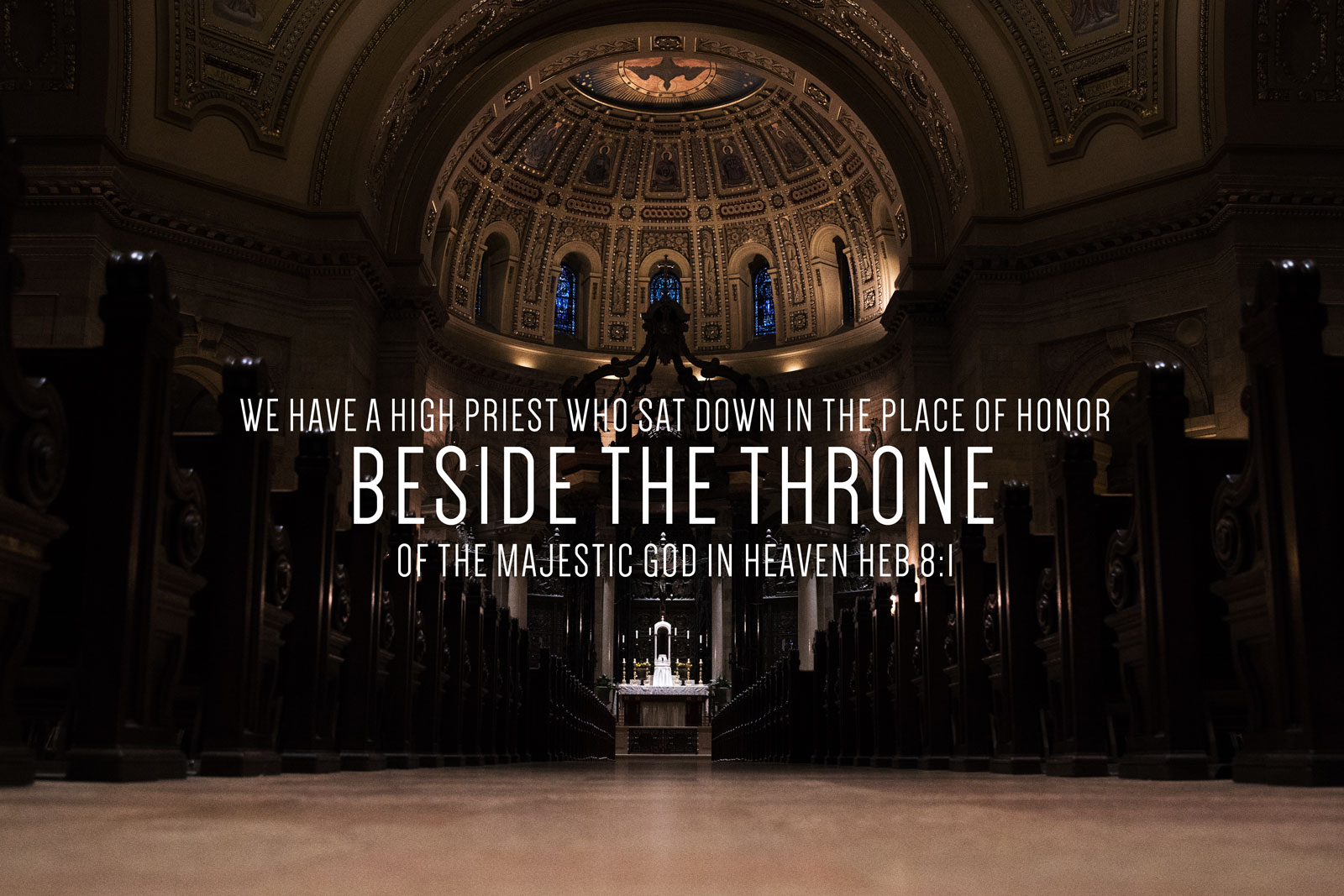Guide: R/2 Sam 18; Heb 8 L/Before the Throne @dustinkensrue P/For those facing loss O/Journal on Heb 8:7-12
Verse of the Day: We have a High Priest who sat down in the place of honor beside the throne of the majestic God in heaven Heb 8:1 NLT
Song of the Day: Before the Throne by the Modern Post — Spotify — Youtube
Bible Reading: 2 Samuel 18; Hebrews 8
2 Samuel 18
Absalom’s Defeat and Death
1 David now mustered the men who were with him and appointed generals and captains[a] to lead them. 2 He sent the troops out in three groups, placing one group under Joab, one under Joab’s brother Abishai son of Zeruiah, and one under Ittai, the man from Gath. The king told his troops, “I am going out with you.”
3 But his men objected strongly. “You must not go,” they urged. “If we have to turn and run—and even if half of us die—it will make no difference to Absalom’s troops; they will be looking only for you. You are worth 10,000 of us,[b] and it is better that you stay here in the town and send help if we need it.”
4 “If you think that’s the best plan, I’ll do it,” the king answered. So he stood alongside the gate of the town as all the troops marched out in groups of hundreds and of thousands.
5 And the king gave this command to Joab, Abishai, and Ittai: “For my sake, deal gently with young Absalom.” And all the troops heard the king give this order to his commanders.
6 So the battle began in the forest of Ephraim, 7 and the Israelite troops were beaten back by David’s men. There was a great slaughter that day, and 20,000 men laid down their lives. 8 The battle raged all across the countryside, and more men died because of the forest than were killed by the sword.
9 During the battle, Absalom happened to come upon some of David’s men. He tried to escape on his mule, but as he rode beneath the thick branches of a great tree, his hair[c] got caught in the tree. His mule kept going and left him dangling in the air. 10 One of David’s men saw what had happened and told Joab, “I saw Absalom dangling from a great tree.”
11 “What?” Joab demanded. “You saw him there and didn’t kill him? I would have rewarded you with ten pieces of silver[d] and a hero’s belt!”
12 “I would not kill the king’s son for even a thousand pieces of silver,[e]” the man replied to Joab. “We all heard the king say to you and Abishai and Ittai, ‘For my sake, please spare young Absalom.’ 13 And if I had betrayed the king by killing his son—and the king would certainly find out who did it—you yourself would be the first to abandon me.”
14 “Enough of this nonsense,” Joab said. Then he took three daggers and plunged them into Absalom’s heart as he dangled, still alive, in the great tree. 15 Ten of Joab’s young armor bearers then surrounded Absalom and killed him.
16 Then Joab blew the ram’s horn, and his men returned from chasing the army of Israel. 17 They threw Absalom’s body into a deep pit in the forest and piled a great heap of stones over it. And all Israel fled to their homes.
18 During his lifetime, Absalom had built a monument to himself in the King’s Valley, for he said, “I have no son to carry on my name.” He named the monument after himself, and it is known as Absalom’s Monument to this day.
David Mourns Absalom’s Death
19 Then Zadok’s son Ahimaaz said, “Let me run to the king with the good news that the Lord has rescued him from his enemies.”
20 “No,” Joab told him, “it wouldn’t be good news to the king that his son is dead. You can be my messenger another time, but not today.”
21 Then Joab said to a man from Ethiopia,[f] “Go tell the king what you have seen.” The man bowed and ran off.
22 But Ahimaaz continued to plead with Joab, “Whatever happens, please let me go, too.”
“Why should you go, my son?” Joab replied. “There will be no reward for your news.”
23 “Yes, but let me go anyway,” he begged.
Joab finally said, “All right, go ahead.” So Ahimaaz took the less demanding route by way of the plain and ran to Mahanaim ahead of the Ethiopian.
24 While David was sitting between the inner and outer gates of the town, the watchman climbed to the roof of the gateway by the wall. As he looked, he saw a lone man running toward them. 25 He shouted the news down to David, and the king replied, “If he is alone, he has news.”
As the messenger came closer, 26 the watchman saw another man running toward them. He shouted down, “Here comes another one!”
The king replied, “He also will have news.”
27 “The first man runs like Ahimaaz son of Zadok,” the watchman said.
“He is a good man and comes with good news,” the king replied.
28 Then Ahimaaz cried out to the king, “Everything is all right!” He bowed before the king with his face to the ground and said, “Praise to the Lord your God, who has handed over the rebels who dared to stand against my lord the king.”
29 “What about young Absalom?” the king demanded. “Is he all right?”
Ahimaaz replied, “When Joab told me to come, there was a lot of commotion. But I didn’t know what was happening.”
30 “Wait here,” the king told him. So Ahimaaz stepped aside.
31 Then the man from Ethiopia arrived and said, “I have good news for my lord the king. Today the Lord has rescued you from all those who rebelled against you.”
32 “What about young Absalom?” the king demanded. “Is he all right?”
And the Ethiopian replied, “May all of your enemies, my lord the king, both now and in the future, share the fate of that young man!”
33 [g]The king was overcome with emotion. He went up to the room over the gateway and burst into tears. And as he went, he cried, “O my son Absalom! My son, my son Absalom! If only I had died instead of you! O Absalom, my son, my son.”
–
Footnotes:
- 18:1 Hebrew appointed commanders of thousands and commanders of hundreds.
- 18:3 As in two Hebrew manuscripts and some Greek and Latin manuscripts; most Hebrew manuscripts read Now there are 10,000 like us.
- 18:9 Hebrew his head.
- 18:11 Hebrew 10 [shekels] of silver, about 4 ounces or 114 grams in weight.
- 18:12 Hebrew 1,000 [shekels] of silver, about 25 pounds or 11.4 kilograms in weight.
- 18:21 Hebrew from Cush; similarly in 18:23, 31, 32.
- 18:33 Verse 18:33 is numbered 19:1 in Hebrew text.
Hebrews 8
Christ Is Our High Priest
1 Here is the main point: We have a High Priest who sat down in the place of honor beside the throne of the majestic God in heaven. 2 There he ministers in the heavenly Tabernacle,[a] the true place of worship that was built by the Lord and not by human hands.
3 And since every high priest is required to offer gifts and sacrifices, our High Priest must make an offering, too. 4 If he were here on earth, he would not even be a priest, since there already are priests who offer the gifts required by the law. 5 They serve in a system of worship that is only a copy, a shadow of the real one in heaven. For when Moses was getting ready to build the Tabernacle, God gave him this warning: “Be sure that you make everything according to the pattern I have shown you here on the mountain.”[b]
6 But now Jesus, our High Priest, has been given a ministry that is far superior to the old priesthood, for he is the one who mediates for us a far better covenant with God, based on better promises.
7 If the first covenant had been faultless, there would have been no need for a second covenant to replace it. 8 But when God found fault with the people, he said:
“The day is coming, says the Lord,
when I will make a new covenant
with the people of Israel and Judah.
9 This covenant will not be like the one
I made with their ancestors
when I took them by the hand
and led them out of the land of Egypt.
They did not remain faithful to my covenant,
so I turned my back on them, says the Lord.
10 But this is the new covenant I will make
with the people of Israel on that day,[c] says the Lord:
I will put my laws in their minds,
and I will write them on their hearts.
I will be their God,
and they will be my people.
11 And they will not need to teach their neighbors,
nor will they need to teach their relatives,[d]
saying, ‘You should know the Lord.’
For everyone, from the least to the greatest,
will know me already.
12 And I will forgive their wickedness,
and I will never again remember their sins.”[e]
13 When God speaks of a “new” covenant, it means he has made the first one obsolete. It is now out of date and will soon disappear.
–
Footnotes:
- 8:2 Or tent; also in 8:5.
- 8:5 Exod 25:40; 26:30.
- 8:10 Greek after those days.
- 8:11 Greek their brother.
Holy Bible. New Living Translation copyright© 1996, 2004, 2007, 2013 by Tyndale House Foundation. Used by permission of Tyndale House Publishers Inc., Carol Stream, Illinois 60188. All rights reserved.



